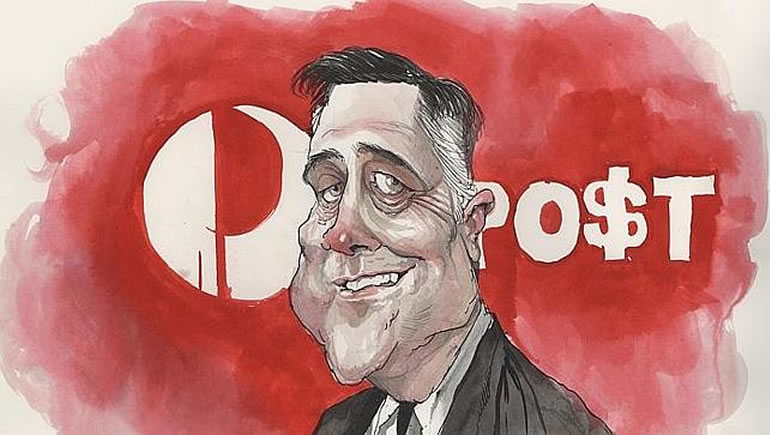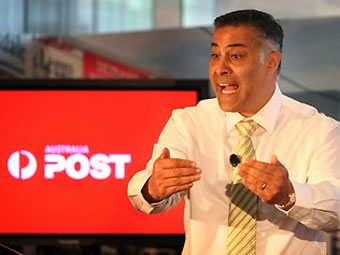
Postal eBulletin 2013 - #20
- Is AusPost boss' $4.8 million salary pushing the envelope?
- CWU demands immediate 3% pay rise for postal workers to catch up
- Campaign to protect regional mail services and job
- Australia Post abandons application in FWC against CWU
- Asbestos incident at Adelaide Mail Centre
- Renewal of self-insurance licence opportunity to fix workers' comp and OHS
- Annual leave blunder
1. Is AusPost boss' $4.8 million salary pushing the envelope? (Crikey)
There have been some very high executive payouts in recent years?-?boardrooms seemed content to plunder shareholder coffers to pay multimillion-dollar stipends to the likes of Wal King, Richard Leupen, Allan Moss, Phil Green and Geoff Dixon. But those esteemed group of executives were at least employed by shareholder-owned companies; the same can't be said for the head of Australia Post, Ahmed Fahour.

By virtue of its status and ownership, AusPost is a very unusual entity. The traditional mail business (its letter delivery business) notionally loses a lot of money ($218.4 million), while its unregulated packages business makes a lot of money ($648 million). Some say that Fahour and his fellow executives face a difficult task because of AusPost's universal service obligation, but that overlooks an inconvenient truth: the money-losing regulated business gives AusPost's package an incredible competitive advantage. That's because the package business can use the entire AusPost network, including some 4400 retail outlets (of which 2651 are in rural areas) and the huge network of posties. So while AusPost's package business doesn't technically have a monopoly (it faces competition from a number of players like Toll and DHL), none of its competitors has its huge inbuilt advantage, especially with rural and east-west deliveries. That advantage comes from the infrastructure associated with the letter business.
Despite working for a public utility, Fahour was paid an unprecedented $4.8 million in 2013, including a whopping $1.9 million base salary and more than $2 million in incentive pay.
To fully understand the enormity of Fahour's remuneration, it needs to be compared with other well-paid bosses. Fahour's payout would have placed him among the top 40 executives in the country?-?that's comparing against every single listed public company (not merely government enterprises). For example, Fahour was paid more than the bosses of Woolworths, Woodside Petroleum, Village Roadshow, Seven, Fairfax, Tabcorp, Seek, Super Retail Group, David Jones and JB Hi-Fi received last year. And don't forget, those executives run highly profitable, publicly listed companies and have to answer to shareholders. Fahour is in charge of a largely protected monopoly and is paid by taxpayers.
Fahour's remuneration is even more remarkable when compared to his international peers. The US Postmaster General (who runs an organisation many times larger than AusPost) received US$384,229 in 2012 (a figure that was criticised by US law-markers for being too high). That means Fahour is paid more than 10 times what his US counterpart is paid. Moya Greene, the head of Royal Mail in the UK, was paid 1.47 million pounds.
Greene, who was roundly criticised for being overpaid, received around half of what Fahour was paid. Canada Post boss Deepak Chopra was paid a base salary of only CA$497,100 with the possibility of a 33% bonus.
Fahour's salary isn't merely high, it's completely off the scale.
While Fahour, a former member of the BRW Young Rich List (by virtue of his roles at Citigroup and NAB), has become one of Australia's highest-paid executives, he appears to show far less generosity to his fellow AusPost employees. Earlier this month, the Communications Workers Union sued Australia Post and Fahour personally after it refused to allow payroll deductions for union membership fees. The union alleged that the payroll stance was spurred by the Victorian union's refusal to sign a new enterprise agreement.
Australia Post workers received a pay rise of 1.5% in 2013. Fahour, already one of Australia's highest-paid executives, received a pay increase of 66%.
Author Adam Schwab is the author of Pigs at the Trough: Lessons from Australia's Decade of Corporate Greed, published by John Wiley & Sons in 2010. This article originally appeared on Crikey.
2. CWU demands immediate 3% pay rise for postal workers to catch up
COMPARE YOUR NEXT PAY RISE
Fahour's Remuneration UP 66.6% to $4,750,000.00 in 2013
Government Dividend UP 26.0% to $244 million
Post Revenue UP 15.0% to $5.9 billion
Profit UP 11.0% to $312 million
CPI UP 2.4%
Your Salary 2013 UP 1.5% This is the last EBA 7 increase
This is the 4th year where your pay is below CPI - a pay cut in real terms
In light of the above YOUR NEXT PAY RISE is absolutely UNFAIR. Hence your union's National Office has written to Ahmed Fahour demanding an immediate 3% pay rise to catch up!
Sign the petition below to demand a further 3% this year as an over EBA payment.
Name (PLEASE PRINT)
Signature
Work Location (PLEASE PRINT)
To receive updates and the eBulletin please provide email address (PLEASE PRINT):
Phone number:
Your email and phone number will not be provided to Australia Post
Send to: Communication Workers Union - National Office. By Post: 9/365 Queen St, Melbourne, 3000.
By Email: cwu@cwu.org.au By Fax: 03 9642 0333
Your National Office has been flooded with petitions from all over Australia. Many of you are also forwarding your email address so to all those reading this bulletin for the first time we say "Welcome"
Please encourage all your workmates to sign the Petition and sign up for E-bulletin too.
3. Campaign to protect regional mail services and jobs
Campaigning continues against Australia Post's slashing of regional mail services and jobs. Liberal member in Geelong, Sarah Henderson has told Australian Post that many of their proposals are unacceptable and has said so publicly.
Politicians of all flavours have indicated to us that they are unhappy with Australia Post's proposals and we will be meeting with an informal Coalition of the unwilling when Parliament resumes. Assistant National Secretary Martin O'Nea met recently with new Shadow Communications Minister Jason Clare and provided an overall briefing on postal issues and a campaign update. The Minister is keen to have an ongoing dialogue with your National Office on both postal and telecommunications issues.
Please contact your union if you would like to be involved in the campaign or have any ideas to share.
4. Australia Post abandons application in FWC against CWU
Australia Post has abandoned its application in the FWC and will not seek orders against the CWU for so-called breach of confidential information by senior CWU officials.
In essence, Australia Post's application to FWC was an attempt to gag the union when we shouldn't be gagged, said Dan Dwyer Divisional Secretary who represented the union in this matter.
It should be self-evident that the role of senior union officials is to represent union members and (that) this includes contact with the media and politicians to press the case for keeping postal services and jobs.
5. Asbestos incident at Adelaide Mail Centre
Floor tiles containing asbestos were drilled into at the Adelaide Mail Centre is a clear breach of safe operating procedures.
The asbestos floor tiles were drilled to install bollards as part of MLOCR/BLC upgrades.

The union had sought to negotiate an asbestos removal program with Australia Post in the OHS Agreement. But, no. Australia Post has an "asbestos management program" in place!
Each facility is supposed to have an asbestos register that is checked prior to any works. This begs the question what happened here?
The onus is on Australia Post to provide a safe workplace. If Post engages a contractor to undertake work where there is an asbestos risk then it needs to ensure that the work is undertaken in a way that asbestos removal procedures are complied with and workers are not at risk of exposure to asbestos dust.
Australia Post claims that the asbestos could not be liberated from the floor tiles by drilling into them. Management engaged an industrial hygienist who claims the asbestos fibres were not released into the atmosphere. In the union's view drilling is one of the easiest ways to liberate asbestos.
The union is continuing to follow up.
6. Renewal of self-insurance licence opportunity to fix workers' compensation and OHS issues
Australia Post's licence to self-insure workers' compensation liabilities expires on 30 June 2014. It is a requirement of the SRC Act that licensees (i.e. AP) have to apply to the SRC commission to have their licence extended beyond their expiry date.
The self-insurance conditions of the licence require compliance with the SRC Act and the Work Health and Safety Act 2011. A licensee is subject to performance reporting standards and measures which require licensees to develop and implement effective management systems for prevention, rehabilitation and claims management.
Australia Post has informally advised the union of its intention to apply to have their licence renewed.
As part of the SRC Commission's consideration of licence renewals interested individuals and bodies may make a submission to the Commission.
We know that members can receive little support when they are involved in an incident, that many others are very stressed due to work overload issues, that as soon as someone speaks up management cracks down on them, that Post blames workers when they are injured, that workers are harassed to come into work when they are sick and that reported hazards may not be treated seriously.
Thus, this is an important opportunity for your union to raise any concerns you may have with Australia Post's performance in relation to OHS and workers' compensation for the purpose of trying to address these concerns by the imposition of conditions on any renewed licence.
Please contact the union on cwu@cwu.org.au if you have any OHS and/or workers' compensation issues that you would like to be raised.
7. Annual Leave blunder
Post has advised that it has made errors in calculating annual leave of a number of staff - resulting in over crediting leave. Post say they contact staff individually. They gave little detail.
We have written to Post seeking details. We also demanded that it any CWU member has taken leave or booked holidays relying on the incorrect advice of Post, then Post should waive any recovery of the leave entitlements. If you are approached and feel disadvantaged, then please contact your Branch.










